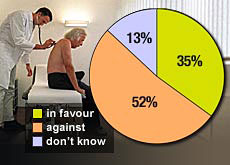Health reform flops at the ballot box

An overwhelming majority of voters have thrown out a proposal for a single health insurance company in Switzerland, with premiums based on income and wealth.
Sunday’s ballot was the latest in a series of attempts to cut rising costs and ease the financial burden on citizens.
Final results showed 71 per cent of voters rejected the reform. Turnout was close to 46 per cent, slightly above average.
As expected, voters in the main German-speaking part of the country turned down the planned reform, which was supported by the centre-left but opposed by the centre-right as well as the business community, parliament and the government.
Opposition in the French- and Italian-speaking regions was less pronounced. Two cantons, Jura and Neuchâtel, even came out in favour.
On average health insurance premiums are higher in western and southern Switzerland than in German-speaking areas.
Interior Minister Pascal Couchepin said a majority appeared to be opposed to “a revolution” in the health sector but wanted to continue the reforms under discussion in parliament.
He called on all sides, notably health insurers and the cantonal authorities, to make renewed efforts to reduce spending and aim for more cost efficiency.
Premiums
There are currently 87 private insurers providing mandatory basic health care coverage for Swiss residents under a 1996 law. But health premiums have soared over the past decade.
More than 100,000 people are no longer covered because they haven’t paid their premiums.
Opponents argued a single insurance system would lead to complacency and create a two-tier system, where only the wealthy could afford to take out additional private insurance coverage.
They dismissed claims that the initiative could help reduce rising health expenditure.

More
Health insurance
Costly
For their part proponents said a single health insurer would boost the efficiency of the system and allow annual savings of at least SFr300 million ($245 million) in administrative costs.
The current funding system is unbalanced, since many clients on low incomes claim state subsidies to pay their premiums, according to the Social Democratic Party and the Greens.
The proposal to merge the insurance companies and introduce premiums based on wealth and income was the latest in a series of attempts over the past ten years to rein in spending on health care.
A similar proposal to change the funding system of the health insurance companies was rejected in 2003 by 73 per cent of voters.
Switzerland has the most expensive health system in Europe, according to an international comparison. It spent 11.6 per cent on health in 2005, ahead of Germany and France but behind the United States.
swissinfo with agencies

More
People’s initiative
Official vote result:
Yes: 28.8%
No: 71.2%
Cantons: Only two of the country’s 26 cantons came out in favour.
Turnout: 45.5%
The people’s initiative for a single health insurance company and premiums based on income and wealth was launched by a family association in western Switzerland.
The proposal had the support of the political left, some trade unions and doctors’ associations.
Parties from the centre-right, the right, the business community, government and parliament as well as the health insurers were against.

In compliance with the JTI standards
More: SWI swissinfo.ch certified by the Journalism Trust Initiative


You can find an overview of ongoing debates with our journalists here. Please join us!
If you want to start a conversation about a topic raised in this article or want to report factual errors, email us at english@swissinfo.ch.